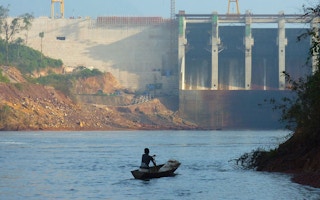This week marks a major coup for climate action advocates: the Paris Agreement enters into force, committing governments to limit global temperature rise to well below 2 degrees Celsius above pre-industrial levels.
As all eyes turn to the Marrakech climate talks starting on Monday, to see how these commitments will be implemented, one question is still missing from discussions: How can we ensure that measures to tackle climate change respect the rights of people, especially the poor and vulnerable?
Companies and governments have a responsibility to ensure their “climate-friendly” steps do not infringe on the rights of people. Yet wind and hydropower projects have been linked to forced displacements, threats, intimidation and killings of local community leaders, while Amnesty International’s latest research has exposed child labour in electric car supply chains.
Based on outreach to 50 wind and hydropower companies, the Business & Human Rights Resource Centre found that, in most cases, human rights policies and practices are not yet rigorous enough.
Although 34 out of the 50 companies have some community consultation commitments in place, only five of them commit to respecting indigenous peoples’ free, prior & informed consent (FPIC). Three of those five have allegations against them about this commitment.
Undoubtedly, renewable energy done right could have enormous benefits to local communities. But how do we get there?
Below are five key steps companies and governments can take:
1. Adopt and disclose human rights policies and due diligence processes in line with the UN Guiding Principles on Business and Human Rights.
Under the UN Guiding Principles on Business and Human Rights (UNGPs), all companies have a responsibility to adopt a clear human rights policy and due diligence process in order to identify, prevent, mitigate and account for how they address their impacts on human rights. Depending on what salient human rights issues companies identify, they can take subsequent steps to address these.
For example, local community and indigenous peoples’ rights are among the most commonly identified human rights issues by renewable energy companies. Wind and hydropower companies have an interest in adopting commitments to rigorous community consultation procedures, including obtaining FPIC, in order to avoid costly conflicts including project delays and lawsuits.
In other sectors, such as the electric car industry, risks include workers’ rights issues in the supply chain. These companies are advised to undertake supply chain due diligence for minerals, including cobalt, using five steps outlined in the OECD Due Diligence Guidance for Responsible Supply Chains, and to adopt specific remediation plans if child labour is discovered.
2. Introduce grievance mechanisms and provide effective remedies in line with the UNGPs’ effectiveness criteria.
Grievance mechanisms are a core part of companies’ responsibilities under the UNGPs. With the right set-up, they can serve as an early warning system for companies to prevent conflicts from escalating.
Yet not many wind and hydropower companies refer to the UNGPs when discussing their grievance mechanisms. Isagen and Vattenfall are two exceptions - more companies can follow their lead and work to align grievance mechanisms with international standards.
Similarly, effective remedies are essential to address supply chain concerns in the electric car industry. Amnesty International specifically calls on companies to implement “a plan to remove children from the worst forms of child labour” and to support children’s physical, educational, economic and psychological needs.
3. Adopt rigorous human rights safeguards for projects financed by international funding mechanisms.
Governments in Marrakech next week have a unique opportunity to shape whether and how funding mechanisms coming out of the Paris Agreement will take human rights into account. The Sustainable Development Mechanism is set to replace the UN’s Clean Development Mechanism (CDM), which currently funds emission-reducing projects.
As Carbon Market Watch has documented, CDM registration of a project does not preclude it from harming human rights. Dozens of CDM-registered projects have faced serious human rights allegations. CDM currently does not have social or human rights safeguards in place, nor does it have an effective complaints mechanism.
The next generation of international funding mechanisms has an opportunity to learn from the CDM’s experience. The Sustainable Development Mechanism should adopt a set of eligibility criteria for projects in line with international human rights standards, develop a system for monitoring and reporting, and adopt an effective grievance process.
4. Adopt and enforce human rights and just transition safeguards in national energy policies.
G20 countries continue to spend US$88 billion per year subsidising fossil fuel exploration – these subsidies need to be the first to go as governments begin to redraft their national energy policies in light of the Paris Agreement and Sustainable Development Goals.
However, this switch is also an opportunity to review relevant safeguards both to protect fossil fuel workers who may lose their jobs and communities whose lands may be affected by renewable energy development.
“
Wind and hydropower projects have been linked to forced displacements, threats, intimidation and killings of local community leaders, while Amnesty International’s latest research has exposed child labour in electric car supply chains.
The International Trade Union Confederation advocates for just transition plans for workers and communities who have been relying on the fossil fuel industry for their livelihoods. Safeguards for renewable energy projects can include reviewing land permit regulations, consultations with affected groups including indigenous peoples, and compensation requirements. These can be set out in national legislation and public procurement processes.
5. Listen to community and worker voices.
Throughout all of these actions, companies and governments must put affected community and worker concerns at the centre of their decision-making. This is what distinguishes neat policies on paper from effective practices on the ground. Policies are an important first step, but they are not the last.
This can range from adopting effective consultation processes on each aspect of company policies and procedures to embracing community- and worker-driven initiatives to improve sectoral approaches, such as the Coalition of Immokalee Workers’ Fair Food Program.
The first step to changing company practices can often be to arrange a visit to the project site or factory for key decision-makers, to give them the chance to meet with the most affected groups and connect with the issues on the ground.
Eniko Horvath is Senior Researcher at Business & Human Rights Resource Centre. This story is published with permission from Thomson Reuters Foundation, the charitable arm of Thomson Reuters, that covers humanitarian news, women’s rights, trafficking, corruption and climate change. Visit http://news.trust.org











